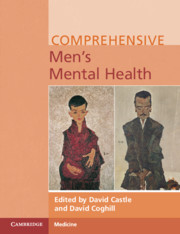Book contents
- Comprehensive Men’s Mental Health
- Comprehensive Men’s Mental Health
- Copyright page
- Contents
- Contributors
- Preface
- Section 1 The Developmental Context and Developmental Disorders
- Section 2 Body Image and Anxiety Disorders
- Section 3 Suicidality and Mood Disorders in Men
- Section 4 Violence, Sociopathy, and Substance Misuse in Men
- Section 5 Physical and Mental Health Overlap
- Chapter 19 HIV and Mental Health in Men
- Chapter 20 Cardiovascular Disease and Mental Health in Men
- Chapter 21 Cancer and Mental Health
- Section 6 Mental Health of Men in Later Life
- Index
- References
Chapter 21 - Cancer and Mental Health
from Section 5 - Physical and Mental Health Overlap
Published online by Cambridge University Press: 10 March 2021
- Comprehensive Men’s Mental Health
- Comprehensive Men’s Mental Health
- Copyright page
- Contents
- Contributors
- Preface
- Section 1 The Developmental Context and Developmental Disorders
- Section 2 Body Image and Anxiety Disorders
- Section 3 Suicidality and Mood Disorders in Men
- Section 4 Violence, Sociopathy, and Substance Misuse in Men
- Section 5 Physical and Mental Health Overlap
- Chapter 19 HIV and Mental Health in Men
- Chapter 20 Cardiovascular Disease and Mental Health in Men
- Chapter 21 Cancer and Mental Health
- Section 6 Mental Health of Men in Later Life
- Index
- References
Summary
Cancer is a disease of ageing, as more DNA mutation errors eventually escape repair mechanisms, and present clinically with a variety of tumours. As the overall cure rate reaches close to 70% and is much higher in a range of specific cancers, many patients end up surviving two or three malignancies. Despite this treatment success, cancer is still deeply feared and viewed by society as a death threat. In many countries, cancer competes with heart disease for status as the leading cause of death in the community.
- Type
- Chapter
- Information
- Comprehensive Men's Mental Health , pp. 232 - 240Publisher: Cambridge University PressPrint publication year: 2021

